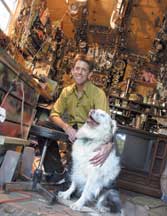|
More in academe
Baby, that's music to me

Academic castaway
Jeff Ferrell was down in the dumps — well, dumpsters — when he researched his upcoming book.
By Jaime Blanton '02

 Jeff Ferrell has never shied from risk, especially in the name of research. So when he returned to his native Fort Worth in 2002 he decided to spend the next eight months living the life of a scrounger, touring the city on a bike he rescued from the dump. Jeff Ferrell has never shied from risk, especially in the name of research. So when he returned to his native Fort Worth in 2002 he decided to spend the next eight months living the life of a scrounger, touring the city on a bike he rescued from the dump.
"I figured the best way to learn more about the culture was to take it on full time," he says. "I knew I couldn't fully understand what brings people to that situation, but I thought I could at least subject myself to the same circumstances, the same vulnerability."
For months, he spent his time with the world-weary residents who live off what others discard. As a result, he may understand Fort Worth more intimately than residents who have lived in the city for years. He has touched its history, pedaled through its neighborhoods, rich and poor, and studied the unique fabric of its culture.
"I knew it would be a huge risk," he says. "What I did not know was just how successful I could be or what I would find."
Urban social movements in America, those aspects of the culture most often cast aside and misunderstood, fascinate Ferrell. In the 1990s he spent nights on the streets of Colorado living with graffiti artists, then wrote a book about it titled Crimes of Style: Urban Graffiti and the Politics of Criminality.
But the culture of the scrounger held particular interest. Could someone really live well reusing what others throw away? What clues could the interaction between scroungers, neighborhood residents and police say about the nation's consumerism?
 To find the answers, Ferrell had to lower his means. Dressed in tattered clothes, he spent afternoons dumpster diving in every area of town. He learned the intricate routes his new scrounger colleagues traveled and followed the social codes they live by. To find the answers, Ferrell had to lower his means. Dressed in tattered clothes, he spent afternoons dumpster diving in every area of town. He learned the intricate routes his new scrounger colleagues traveled and followed the social codes they live by.
As for the residents he relied on for their trash, a few people watched him work with a suspicious eye. A couple of folks threatened to call the police, but most understood their items were about to be reused.
Ferrell's Arlington Heights home is now filled with treasured finds from the street. While he was furnishing the house and earning money from the scrap metal he collected, wife Karen -- he says she finds his passion strange, fascinating and often amusing -- paid bills with the $9.50 an hour she earned as a grocery clerk.
"I brought everything home," he says. "Good suits, used but working appliances, glass doorknobs, clocks, chairs."
Despite the variety and quantity of items, it was the people Ferrell encountered who left a lasting mark. "I couldn't have met the unforgettable people I met if I'd stayed in the insulated world of an academic."
From the elderly woman who risked missing free dinner at a local shelter to help him find sweaters that might fit, to the wheelchair-bound character who warned him to beware of bees when collecting soda cans alongside the road, the people he befriended (and was befriended by) will never completely fade from memory.
"There are so many misconceptions about people who live on the street," Ferrell says. "I learned that some are indeed down on their luck or just don't make enough money at their minimum-wage jobs to make ends meet.
"Many others live this way because they lack formal education or the circumstances to get a full-time job. They appreciate the freedom that comes from not having to report to anyone. No boss. No set hours. I must confess I can understand why they like that."
Ferrell, an associate professor who joined the faculty in 2002 after his scrounging stint and is finishing up a book on the experience, says it provided as much a lesson in the tragedies of history as in the resiliency of the human spirit. He describes his discoveries as remarkable, heartbreaking, alarming and inspiring.
"I found 100-year-old brassed baby shoes, ancient photos, antiques, diplomas, personal letters -- someone's life on the curb. I sorted through the spoils of what I figured were broken relationships, which helped me develop the theory of the exiled boyfriend -- the guy who did wrong and literally got kicked to the curb."
Ferrell expected to find evidence of rampant consumerism. The most blatant proof came in an upper-class neighborhood: a trash bag full of barely opened baby gifts.
"The tags were still on," he says. "It was obvious someone had a shower for prestige, not necessity."
He counted on discovering a unique society within the city's larger society. "Scroungers have an etiquette. A system. They help each other out. If I found something I couldn't use, I would set it aside for someone else. The rule is nothing useful goes to waste twice."
He did not, however, anticipate the profound nature of many of his discoveries.
"There was a bit of tragedy in it sometimes. And a warning. America is a nation of spenders, wasters. We live in one of the world's wealthiest nations. We're so wealthy that the least among us can, with creativity and innovation, live off what others just don't want or need anymore."
Making his daily rounds, Ferrell toured neighborhoods on every level of the financial spectrum. He combed the weeds of municipal and county golf courses for balls he could sell for 17 cents apiece.
Sometimes he didn't have to hunt very hard. He once came across a lawn mower on the curb bearing a sign. "Take me."
"When I tried it and it roared to life, I took its advice," he remembers with a laugh.
He found several such such notices, evidence, he says, that many Fort Worth residents recognize the usefulness of goods they no longer want. He also believes that others discard out of "sheer laziness." But, he clarifies, "that's not a judgment, just an observation."
Ferrell blames society's transient, fast-paced nature for Americans' tendency to throw stuff away. He salvaged a pair of high-quality athletic shoes one day on a ride along the bike path near the Trinity River. The shoes had been skunked. The odor was obviously too much for the previous owner, but Ferrell took them home, aired them out and wore them.
Ferrell, who still spends weekends and some evenings eyeing neighbor curbsides for treasure, sums up his scrounging days without much mention of his finds.
"The moral of the story isn't about shoes or books of poetry or appliances," he says. "It's about the policies our society has established based on our misconceptions of this culture, and it's also about the important role these forgotten people play in recycling the excess of our marketplace."
Jeff Ferrell is the author of Crimes of Style: Urban Graffiti and the Politics of Criminality and Tearing Down the Streets, Adventures in Urban Anarchy, and co-editor of three books. He is the 1998 recipient of the Critical Criminologist of the Year Award, presented by the American Society of Criminology.
Contact Ferrell at j.ferrell@tcu.edu.
Comment at tcumagazine@tcu.edu.

Top
|



